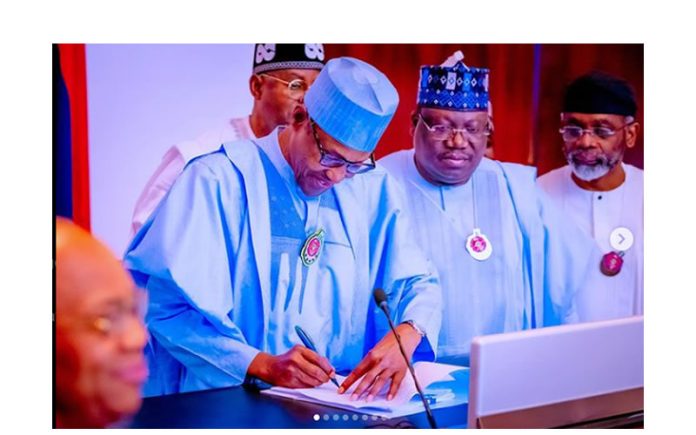The National Assembly will reconsider the current tax exemptions and concessions to examine the eligibility of the beneficiaries.
This, he said, will expand the revenue streams of the federal government to finance the implementation of the 2023 appropriation law.
Senate President Ahmed Lawan revealed this on Tuesday shortly after the President, Maj-Gen Muhammadu Buhari (Ret), signed into law the 2023 budget of N21.83 trillion along with the 2022 Supplementary Appropriation Bill. .
Buhari signed the 2023 transition budget at the Council Chambers in the Presidential Village, Abuja, in the presence of Vice President Yemi Osinbajo, Speaker of the House Femi Gbajabiamila and other members of the Federal Executive Council.
Lawan argued that implementing the 2023 budget will require considerable internal resource mobilization over the next five months.
Therefore, the legislature will review all existing tax breaks and examine the eligibility of all recipients.
This, he said, will be part of efforts to increase income without imposing more taxes on Nigerians.
“Ours is that we focus on the next five months. We still have something worth doing, even though both chambers have done almost everything we consider to be our legislative agenda.
“But Nigeria faces revenue challenges. And this is going to be our focus. This is going to be what the National Assembly, both houses, are going to make sure that we get revenue, find more sources, better sources, stabilize resources and of course look at some of the legislation and some of the waivers and concessions given to see . whether or not they deserve to continue to be implemented in the manner in which they were approved. Or we need to reverse that because we need money in our country.
“But that doesn’t mean we should raise taxes that will go through the roof to cause problems for our citizens. But I believe that as the National Assembly, in the next five months, we must seek to increase the funds available to the government and also ensure that the budget deficit is minimized in the next assembly by the grace of God,” Lawan explained.
For his part, the speaker of the House of Representatives, Femi Gbajabiamila, said that the National Assembly adjusted various portions of the budget for the good of the country.
“Ours is that we receive proposals and that is why they are called proposals. We need to collate all those proposals, look at what’s on the ground in the various constituencies. And we have budget defense, we have ministries, we have departments, we have agencies that come to talk to us.
“We look at the reality of the field and what they have before them. And whether or not they can really execute their mandate according to their ministries and departments. It now corresponds to the National Assembly, where it is attenuated to adjust figures, either downward or upward. And that is exactly what we have done.
“You see that the problem with the National Assembly is that you cannot win to lose. If you return the quote exactly as is, it is called a rubber stamp. If you do what you’re supposed to do and adjust the numbers for the good of the country. You call it lift or fill,” he said.







